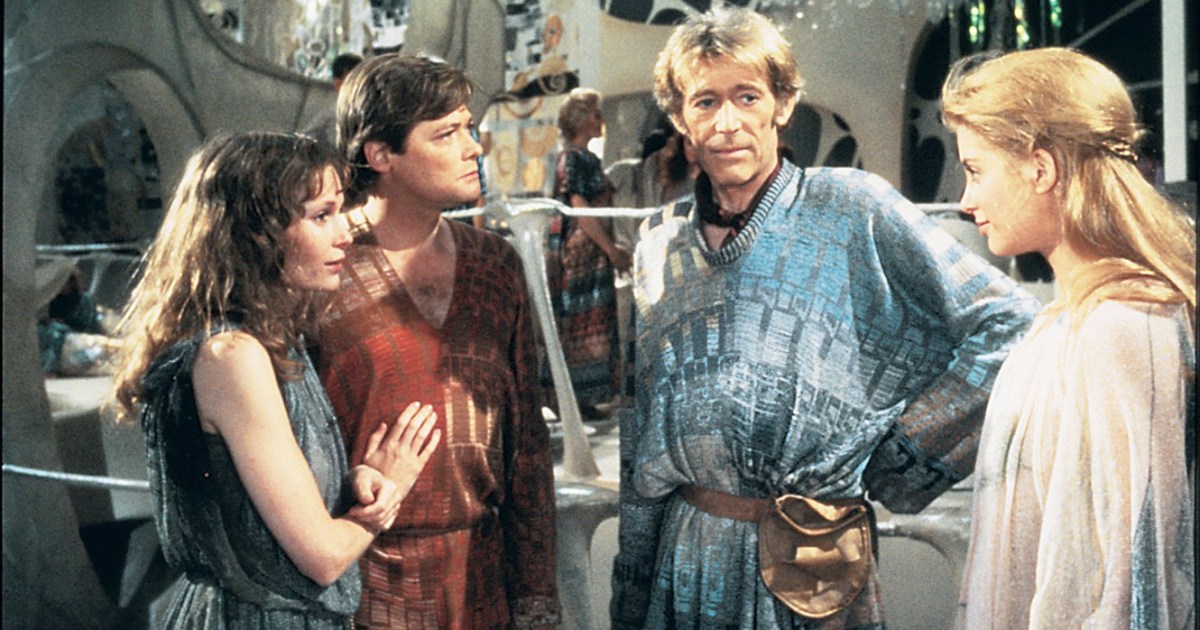Forty years ago, superhero cinema changed forever with the release of what is undoubtedly the worst movie within the genre. Supergirl, directed by Jeannot Szwarc and written by David Odell, stars Helen Slater as the titular character and acts as a direct sequel to Superman III and a spinoff of the hugely successful Christopher Reeve superhero series. The film, ostensibly made to capitalize on Reeve’s popularity, made certain sense, at least on paper — if something works, why not do more of it?
Alas, Supergirl received scathing reviews and quickly cemented itself as a timeless classic of hideousness, a woefully misguided mess of a movie with little to no redeeming qualities. Indeed, it takes a lot for a movie to be truly considered awful — the ’80s are full of so-bad-they’re-good movies that still have value and unexpected riots of pure entertainment.
Yet, Supergirl is not that kind of movie; it’s plain bad. Loud, bafflingly misguided, and guilty of committing the cardinal sin of thinking the audience is as dumb as itself, Supergirl is a cautionary tale about everything a superhero movie shouldn’t be. On its 40th anniversary, let’s look back at the infamous legacy of Supergirl, without a doubt the worst superhero movie ever made.
The Last Daughter of Krypton

Like your typical superhero origin story, Supergirl introduces its titular character as a spunky, can-do hero-in-the-making. Kara Zor-El lives in Argo City, which survived the doom of Krypton by escaping to a pocket of transdimensional space. When the mysterious object that powers Argo City is accidentally rocketed into Earth, Kara must travel to the blue planet, where she poses as Superman’s cousin and discovers her newfound powers courtesy of the yellow sun. Soon, Kara will enter a fight with Selena (Faye Dunaway), a would-be-witch who seeks to claim the object to free herself from an inconvenient relationship with a warlock.
From that premise alone, you can pretty much guess what kind of movie Supergirl is — a batsh*t crazy one. It attempts to blend traditional superhero tropes — big-scale action scenes, ditzy humor, world-ending stakes — with the silliest aspects of fantasy: witches with silly tunics, love potions, would-be-princesses. The result is a truly puzzling and uneven excuse for a movie, a malformed wannabe blockbuster desperate to recapture the lighthearted charm of Christopher Reeves’ Superman movies without an ounce of their honesty or intelligence.

Supergirl is such a silly movie. The plot is infantile, the visual effects (if you can call them that) are hilariously ridiculous, the directing is inept, and the acting … oh boy, the acting. Slater, bless her heart, is trying her best, and you can tell. She brings considerable enthusiasm and commitment to her performance, and with a better, less amateurish screenplay, she might have delivered a solid performance.
Yet, Supergirl buries her well-meaning efforts under a pile of nonsense. With such a juvenile story executed so lazily, Slater’s performance goes from bubbly to outright childlike. “What is a train?” she asks in a way that makes you want to gag and laugh at the same time. Supergirl makes her performance seem rougher and clumsier than it should be, which is a disservice to her otherwise honest efforts.

Slater isn’t Supergirl‘s only victim. Even consummate pros like Peter O’Toole and Mia Farrow can’t escape the film’s laughably terrible grasp — I’ll give you a minute to process the fact that eight-time Oscar nominee Peter O’Toole is in this rubbish. O’Toole, of course, does a lot better than Slater, bringing some much-needed dignity to his role on account of being a renowned thespian who could have made the phonebook sound like Shakespeare. Yet, there’s only so much he can do when asked to repeatedly say the word “squirt” unironically.
Witchie dearest

In their 1980 review of the camp classic Mommie Dearest, Variety wrote that “Dunaway does not chew scenery. Dunaway starts neatly at each corner of the set in every scene and swallows it whole, co-stars and all.” They could have very well been talking about her performance in Supergirl. Indeed, one simply cannot talk about Supergirl without addressing the giant elephant in the room that is Faye Dunaway as the villainous Selena.
By 1984, Dunaway was firmly in her camp goddess era, perhaps because those were the only roles she got offered post-Mommie Dearest. Thus, she comes into Supergirl guns blazing, ready to once again devour the entire movie whole. Subtlety isn’t a word one would relate to a movie like Supergirl, and it’s largely because of Dunaway’s performance. As the witch Selena, Dunaway is very obviously there to have fun and enjoy herself. There’s a very clear element of self-awareness in her performance, which makes it all the more enjoyable, but also terribly laughable.
Especially in her scenes with Oscar nominee Brenda Vaccaro, Dunaway is delightfully larger than life. At one point, Vaccaro and Hart Bochner’s character — a bland male lead who somehow gets both Slater AND Dunaway to fall madly in love with him — sit down to eat chips while watching Supergirl try to escape the Phantom Zone. Meanwhile, Selena puts on glasses and sits down to peruse several books, looking for the answer to her Supergirl problem.
Near the end, Selena declares herself “princess of Earth,” which is hilarious in and of itself, but leads to a final confrontation with Supergirl that is the stuff of camp dreams. Dunaway enunciates every word with telenovela-like inflection, surely lamenting the lack of a mustache to twirl. At many points, you kind of think she’ll spew something like “Barbara, please!” at Vaccaro’s Bianca. Selena then proceeds to use her magic (complete with a voodoo-like scepter, because, of course) to fight Supergirl by making the ground underneath shake; never mind that Supergirl can fly!
The final sequence is everything Supergirl does right and wrong: it’s loud, silly, talky, laughable, and ridiculously enjoyable. The whole thing is cartoonish, which isn’t necessarily a bad thing, but Supergirl doesn’t know how to have fun with it. Instead, it’s up to Dunaway to make the whole thing more entertaining, and to her credit, she does so admirably.
Woman of Yesterday

In short, Supergirl‘s problem is very clear: it’s an antiquated movie, even by 1980s standards. It tries to replicate the magic of the Reeve movies by imitating them to the tee. To its credit, Slater was as good a companion to Reeve as they could have found, and the first two movies were so beloved that it made sense to copy them. But audiences had changed by the early 1980s, and the wholesome, can-do approach of the Superman movies already felt stale — even Reeves’ movies were hurt because of that: Superman III and the infamously terrible Superman IV: The Quest for Peace prove it.
Yet, the issues with this movie run deeper than just being overly indebted to what came before. Supergirl is a misguided effort in every sense. It aims to entertain by offering the dumbest, simplest, least challenging narrative through a screenplay that thinks spelling everything out is the way to go. To make up for it, every little detail is taken to the extreme, but with such a blah story, all that muchness becomes, dare I say it, stupid.

And what a shame because the cast is very good, and with better writing and directing, they might have delivered a pretty decent movie. Supergirl would still be rather straightforward and undemanding because its ambitions don’t go beyond keeping your eyes on the screen for two-plus hours, but it would at least not be the train wreck it is today. Alas, it’s not about what could have been, but about what is, which is Supergirl. Truth be told, Slater’s honesty and Dunaway’s grandness deserve better than it, and you do, too.
Supergirl is available to rent or purchase on Amazon and other digital vendors.
Read the full article here















